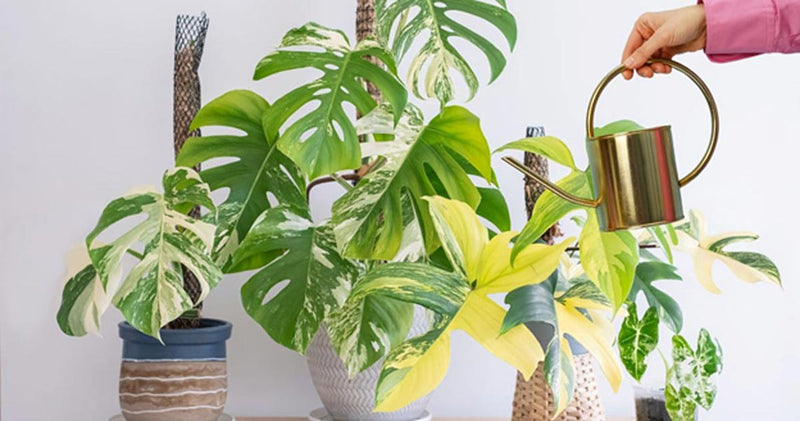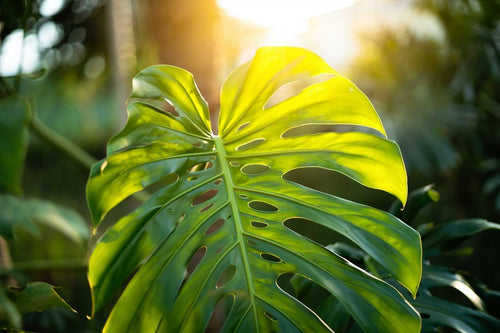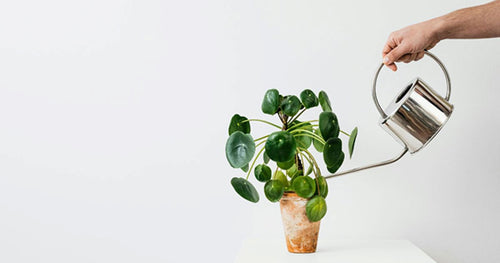Should I Give My Variegated Monstera Silica?

The variegated Monstera is a stunning plant, prized for its beautiful, multi-colored leaves that can range from creamy white to vibrant green. However, due to the unique nature of its variegation, the plant can sometimes exhibit weaker growth and a higher susceptibility to environmental stressors. One effective but often overlooked supplement to improve the health of your variegated Monstera is silica. This mineral has a range of benefits that can help strengthen your plant's growth, improve its pest resistance, and ensure it thrives in your care.
The Benefits of Silica for Variegated Monstera
How Does Silica Strengthen Monstera Cell Walls?
Silica plays a crucial role in strengthening the cell walls of plants, providing them with the necessary rigidity and structure. This is especially beneficial for variegated Monsteras, whose leaves often contain less chlorophyll and can be weaker as a result. Because variegation leaves less chlorophyll for photosynthesis, the plant’s energy production is somewhat limited, making the leaves more prone to damage.
By incorporating silica into your Monstera's care routine, you help the plant form stronger cell walls. This improves the overall integrity of the leaves, preventing breakage and tears. Silica helps to fortify the plant’s structure, making it better able to withstand environmental challenges like high winds or heavy rain, which could cause weaker leaves to tear or bend.

How Does Silica Improve Pest, Disease, and Drought Resistance?
Silica has been shown to increase a plant's resistance to pests and diseases, which is a big advantage for Monstera plants. Variegated plants, being a bit more delicate, can often attract pests like spider mites, thrips, and fungi. The added silica reinforces the plant’s outer layers, making it more difficult for pests to penetrate and establish themselves. The silica in the plant's cell walls acts as a deterrent, strengthening the defenses against harmful insects and pathogens.
Furthermore, silica can help Monstera plants handle drought and overwatering more effectively. It improves the plant's ability to retain water and manage moisture levels in the soil, reducing the stress caused by inconsistent watering. Silica aids in improving the plant’s overall stress tolerance, ensuring it can thrive even under less-than-ideal conditions.
How Does Silica Aid Nutrient Uptake for Monstera?
One of the key benefits of silica for variegated Monstera is its ability to enhance nutrient uptake. Silica helps to optimize root function, which is essential for the efficient absorption of calcium, magnesium, and potassium. These nutrients are essential for healthy growth, cell division, and strong leaf development.
Additionally, silica plays a role in preventing nutrient lockout, which is a common issue in potted plants. In cases of nutrient lockout, plants struggle to absorb essential minerals, even if they are present in the soil or water. Silica helps prevent this by improving the soil’s structure, allowing nutrients to be more readily available to the roots.

Why Variegated Monstera Needs Silica More Than Regular Monstera
Variegated Monstera has weaker growth compared to its fully green counterparts. This is because the variegation disrupts the normal photosynthetic process, meaning the plant has less energy to allocate to growth. As a result, it becomes more vulnerable to stressors, including environmental damage and pest attacks.

CAPTION: Results in just 8 weeks: This variegated Monstera developed stronger, more upright growth with noticeably fuller foliage after adding Silica Strength to its routine.
Silica can help fill this gap, offering structural support where the plant might otherwise struggle. The increased rigidity from silica helps prevent common problems such as leaf curling, browning, and weak stems. It strengthens the plant's overall structure, which is particularly important for variegated Monsteras.
What to Look for in Silica for Variegated Monstera?
Where Does Silica Come From?
Silica comes from both natural and synthetic sources. Natural sources include diatomaceous earth, rice hulls, and volcanic rock. These provide a more slow-release form of silica that can steadily benefit your Monstera over time. On the other hand, synthetic silica, such as monosilicic acid, is absorbed more quickly by plants and offers faster results.
Both types of silica have their merits, but for Monstera plants, particularly variegated ones, it’s crucial to choose the form that aligns with your specific goals. If you want quicker results, synthetic silica might be your best bet. However, if you’re looking for a more natural, slow-release form, then diatomaceous earth or rice hulls may work better.

What Type of Silica Is Best for Monstera?
When choosing a silica supplement for your Monstera, it’s important to consider both the form and concentration. Two common forms are monosilicic acid and potassium silicate. While monosilicic acid is absorbed more quickly, it tends to be unstable and less shelf-stable in concentrated form.
Potassium silicate, on the other hand, is more stable and well-suited for regular, long-term use—especially in houseplant formulas designed for gentle, consistent application. It still delivers the structural benefits of silica, supporting stronger stems, improved posture, and better resilience to stress over time.
For indoor plants like Monstera, a pre-diluted liquid potassium silicate solution is often the most practical and effective choice. It’s easy to incorporate into your routine, safe for frequent use, and provides ongoing structural support that’s especially helpful for variegated varieties.
Avoid highly concentrated agricultural blends or powdered silica, which can be harder to measure and may overwhelm delicate indoor plants. Instead, look for a formula that’s made specifically for houseplants, with usage instructions tailored for small-scale, consistent care.
Ideal Silica Concentration for Monstera Growth
Silica can be a powerful tool in supporting the health and structure of your Monstera—especially variegated types, which tend to have weaker cell walls. When used correctly, silica strengthens stems and leaves, helping the plant resist breakage and physical stress.
However, it's important not to overdo it. High concentrations of silica can actually make leaves too rigid, reducing their natural flexibility and making them more prone to cracking or damage. For houseplants, a gentle, low-dose formula is best—something that delivers the benefits of silica without overwhelming your plant.
Look for a ready-to-use liquid silica supplement designed specifically for indoor plants. These are often pre-diluted to safe levels and easy to add to your regular watering routine. Always follow the product's usage instructions, and avoid industrial-strength or highly concentrated formulas intended for outdoor or agricultural use.
Should Silica Be Paired With Other Nutrients?
Silica works best when paired with other essential nutrients like calcium and magnesium, as these minerals contribute to the development of strong cell walls. However, you should be cautious not to overuse nitrogen, as too much of this nutrient can result in excessive rigidity, making the plant more susceptible to damage.

How to Give Silica to Your Variegated Monstera
How Often Should You Apply Silica?
For best results, apply each and every time you water, depending on your plant’s stress level and environmental conditions. If your Monstera is recovering from damage or repotting, every 2 weeks is ideal. Consistency is key—many plant owners begin to see firmer stems and healthier growth within 3–6 weeks of regular use.
Dilution & Application Methods
Always follow the dilution instructions provided on your product label. For Silica Strength, mix ½ teaspoon per gallon of water and apply with every watering for best results. This low-dose formula is designed specifically for houseplants, so there’s no need to calculate parts per million (PPM) or worry about complicated mixing.
Silica should be added to plain water—not combined with fertilizer—to ensure proper absorption. You can mix up a batch in your watering can or a dedicated container and use it consistently as part of your regular care routine.
Should You Use Silica With Other Fertilizers?
Yes, but it’s important to apply silica and fertilizer separately. While silica doesn’t significantly alter pH, combining it with fertilizer in the same watering can may interfere with absorption and reduce effectiveness.
For best results, alternate between your silica solution and your usual fertilizer. This allows each product to do its job without competing for uptake, helping your plant make the most of both.

FAQs About Silica and Variegated Monstera
Does Silica Help with Browning Leaves on Variegated Monstera?
Yes! Silica helps improve moisture regulation in your Monstera, reducing the likelihood of brown edges and crispy leaves. By strengthening the plant's ability to retain moisture, silica can help it maintain healthy, vibrant foliage.
Can I Use Too Much Silica?
Yes, excessive silica can lead to overly rigid leaves, making them prone to cracking or breaking. It's essential to follow the recommended dosage and avoid overuse.
Can I Use Silica with LECA or Semi-Hydroponics?
Absolutely! Silica is even more important in hydroponic systems or with LECA (Lightweight Expanded Clay Aggregate) because natural silica found in soil is absent. Silica helps strengthen plant growth in these environments.
Is Silica a Replacement for Calcium and Magnesium?
To create a complete "meal" for your Monstera, combine your Monstera Plant Food, Multivitamin, and Silica. The Monstera Plant Food provides essential macronutrients like nitrogen, phosphorus, and potassium, along with secondary nutrients such as calcium and magnesium for overall plant health.
The Multivitamin supplies vital micronutrients like iron, manganese, and zinc, which support enzyme activation, chlorophyll production, and disease resistance. While Silica doesn't replace calcium or magnesium, it enhances the absorption of these nutrients, strengthens cell walls, and improves the plant's resilience to pests and environmental stress. Together, these products offer a balanced nutrient plan to support your Monstera’s growth and health. Just be sure to use it properly and in moderation to reap the maximum benefits!
To keep your Monstera thriving, don’t wait—add Silica to your care routine today! Give your Monstera the strength and resilience it needs to flourish and become the centerpiece of your space!
Download our free Silica Strength Guide to learn more about Silica Strength.






